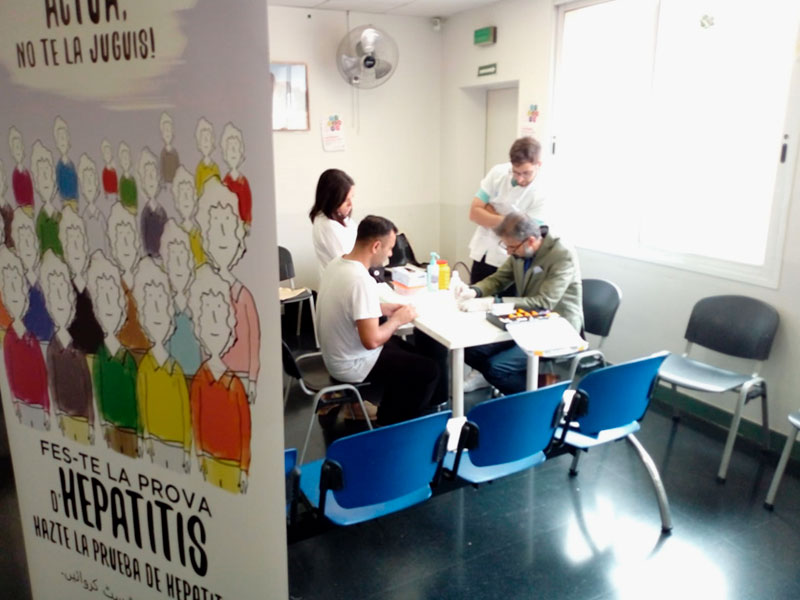New community strategies to promote Health and screening for the micro-elimination of hepatitis C in migrants

According to data from the World Health Organization (WHO), there are 71 million people in the world with chronic infections of hepatitis C (HCV). New antiviral treatments can cure more than 95% of cases and the WHO has fixed an objective of eliminating the disease as a public health problem by 2030. However, many groups of people lack an understanding of the disease and have limited access to diagnosis and treatment. For these reasons micro-elimination strategies are key and Dr Elisa Martró, from the Hospital and Institute Germans Trias i Pujol (IGTP), in collaboration with Dr Jordi Gómez i Prat of the Public and Community Health Team of the Preventive Medicine Service at the Vall d'Hebron University Hospital, are using such a strategy to focus on approaching social groups known to be vulnerable.
The project is called HepC-link and is a prospective sample study based on actions carried out with the community and 520 migrants who have come from Pakistan to Barcelona or the metropolitan area have taken part. The Pakistani population is the fifth largest migrant group in Catalonia and it is country where hepatitis C is endemic. Subjects were recruited between March 2019 and February 2020. The results have been presented at the Digital International Liver Conference (ILC2020).
HepC-link combines two strategies, previously validated by the same researchers, to improve the access to treatment for hepatitis C. Dr Elisa Martro's team at the Germans Trias i Pujol Hospital have been working since 2015 on simplifying diagnostics for hepatitis C by developing and testing a screening strategy in vulnerable groups. It combines a rapid antibody test followed by a laboratory test to detect the RNA of the virus in few drops of blood that have been dried. This strategy simplified diagnostic technique has been combined with a community strategy for detection, education and promotion health for viral hepatitis and understanding of the diagnosis and treatment developed at the Vall d'Hebron hospital by the team led by Jordi Gómez i Prat. It is an educational tool called HEPARJOC, which has been tested and works for hepatitis B in migrants mainly from Sub-Saharan Africa, Pakistan and Morocco. For the HepC-link Project it has been translated into Urdu, the common language in Pakistan and its efficacy for improving knowledge of hepatitis C has been validated.
"The game is introduced in sessions in the community and finishes with the showing of a video that encourages people to take the test to find out if they are infected by the hepatitis virus," explains Dr Gómez i Prat.
"The novelty of the HepC-link project is that we offer the test on the spot at the end of the session with a small finger prick," adds Dr Martró. In the case that the sample is positive for antibodies for HCV a sample of blood is taken from the finger and dried, this is used to test whether the person has the virus; in the case that they are, they are referred for treatment directly.
"We know that to reach those patients that have not been diagnosed we have to go and find them and this study has allowed us to do so," explains Dr Gómez i Prat.
"We have seen that nearly 35% of participants didn't know what hepatitis C was, and that 99.4% accepted the rapid test after the sessions," outlines Martró. "Of the total, 23 rapid tests (4.6%) were positive for antibodies and six of these had the virus (1.2%). The rapid link to treatment means that we could follow up and treat five of these patients," she adds. The researchers consider that these numbers justify the screening aimed at this group. "This strategy has been well accepted by the community and so we consider that its implantation as a regular action should be considered," says Dr Gómez i Prat. This way it can be applied to other groups of migrants from other countries with endemic hepatitis C and the detection of hepatitis B will also be increased.
The two research groups have worked in a collaboration with the professionals of the Centre for Epidemiological Studies of Sexually Transmitted Disease and AIDS in Catalonia (CEEISCAT) and the Hepatology Service of the Vall d'Hebron University Hospital with the support of the Public Health Agency in Catalonia (ASPCAT).
Easier to Access Treatment
The HepC-link Project has gone one step further to be proactive with community education and to bring diagnostics closer. "On many occasions people don't go to the health centre for screening like this, so going to them and explaining the importance of detecting the disease and offering them the test is what makes this project such a success," says Tahir Rafi, Community Agent for the Prevention Service at Vall d'Hebron.
"We have provided the antiviral treatment for those patients testing positive in the study. It is usually a hospital treatment, we have trained members of the International Health Unit Drassanes-Vall d'Hebron to make it easier for migrants to access treatment until they are cured," concludes Dr Maria Butí, collaborator from the Hepatology Service at the Vall d'Hebron Hospital.
Additionally, Dr Martró has worked with researchers of the CEEISCAT to compare data for this community strategy with Pakistani people who have been treated in primary care and compare costs. This information will be evaluated together with the whole team at ASPCAT and will be implemented in the Prevention and Control Plan for Hepatitis C in Catalonia. The project has been funded by the First Edition of the Gilead grants for Micro-elimination of Hepatitis C in Spain.
